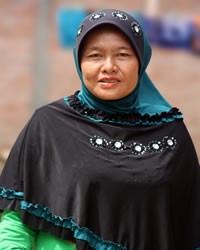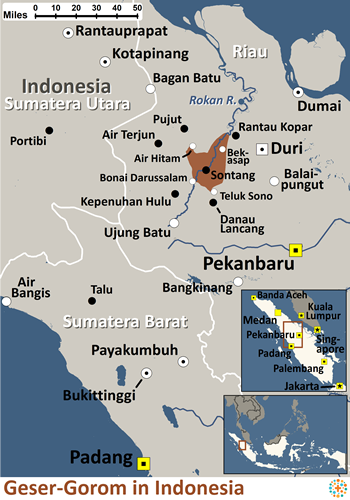The Bonai people, living in Riau Province, used to be considered an isolated and difficult to access group. But with current development, the Bonai can be considered no longer isolated. They now live in adequate settlements and have education like most other Indonesian communities. The name Bonai come from the word manai, which in the Bonai language means "a lazy person." Others, however, believe the name Bonai was given because many bonai trees grew in this group's former location.
The Bonai live in villages near the Rokan Kiri and Rokan Kanan Rivers, in the districts of Tanah Putih, Kepenuhan, Kunto Darusallam, Rokan IV Koto and Bonai in Rokan Hulu Regency, Riau Province. They speak the Bonai language, which according to linguists is part of the Malay language cluster. The Bonai language at first seems like Malay, but much of its vocabulary is similar to the Batak Mandailing and Minangkabau languages.
Some of the Bonai community work as farmers, growing fruits and vegetables. They also raise animals to add to their income. Their income is now consistent with current national standards.
Their marriage customs generally follow the Luhak Kepenuhan traditions, with some borrowing of Bodeo customs as an addition to complete the marriage celebration. Anyang kalu is a food made from kalu fish, a special dish called Ulak Patian, which formerly was served to honored guests.
Some arts of the Bonai include the Buong Kwayang dance, with traditional medicine wrapped a traditional dance. This dance absorbed poetry with an Islamic flavor, opening with the greeting "salamualaikum" to the right and to the left. Cegak, (awang-awang, selesai, baju), is a kind of dance used in wedding celebrations and on other festive occasions, in which several people wrap their bodies in dried banana leaves and dance, accompanied by gondang borogong (a percussion instrument). Tahan Kuli is a traditional magical ritual in which a person injures himself without leaving any mark. Lukah Gilo (crazy bamboo) is a traditional ceremony in which several people hold a long bamboo pole, and an evil spirit comes into bamboo and shakes the bamboo uncontrollably.
In the past, the Bonai beliefs were animistic. But as the group became more accessible, Islam entered the community. The entrance of Islam divided the Bonai people into a number of different groups, acknowledged fully by Luhak custom as Molayu Panjang, Suku Molayu Bosa, Kandangkopuh, Bono Ampu, Kuti and Moniliang. The traditions of the Bonai people are influenced by Malay Islamic traditions, which drew them to embrace Islam. At present, the vast majority of Bonai people profess Islam.
The greatest needs of the Bonai are still economic development and education, since it has been less than one generation since they were isolated and difficult to access from the outside world.
Pray for God to thrust out workers to the Bonai people.
Pray for a spiritual hunger that will lead Bonai leaders to seek and find the only savior.
Pray for them to diligently access gospel materials in their language such as the JESUS Film.
Pray for Bonai disciples to make more disciples.
Scripture Prayers for the Bonai in Indonesia.
| Profile Source: Joshua Project |

























